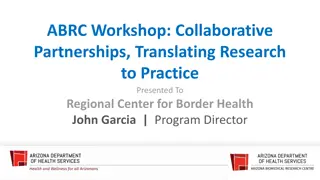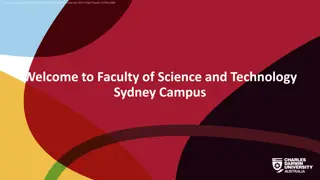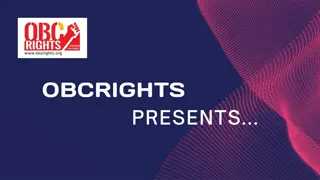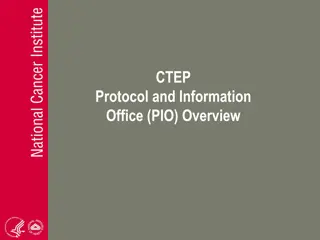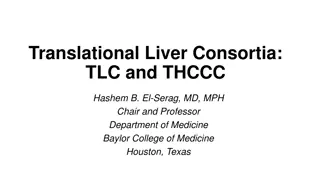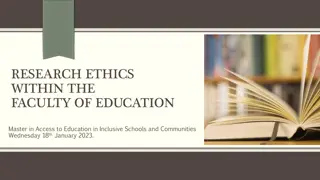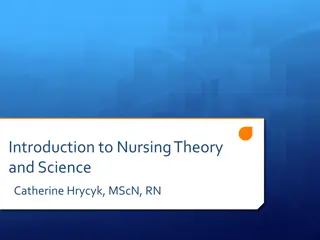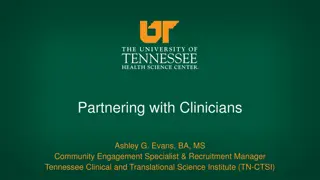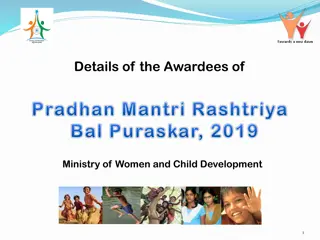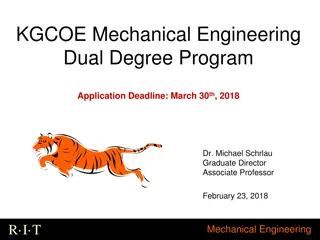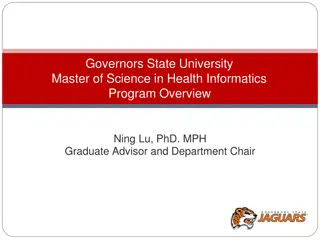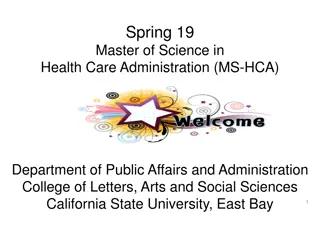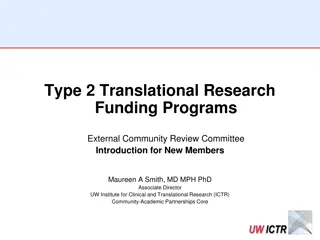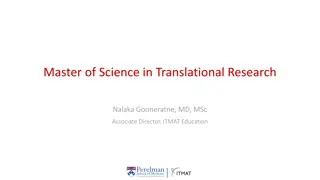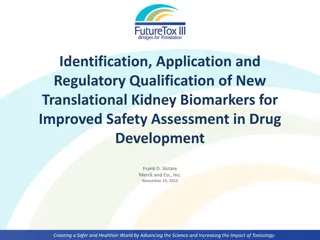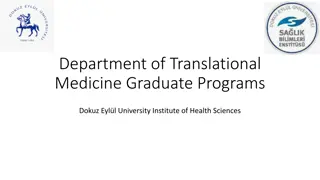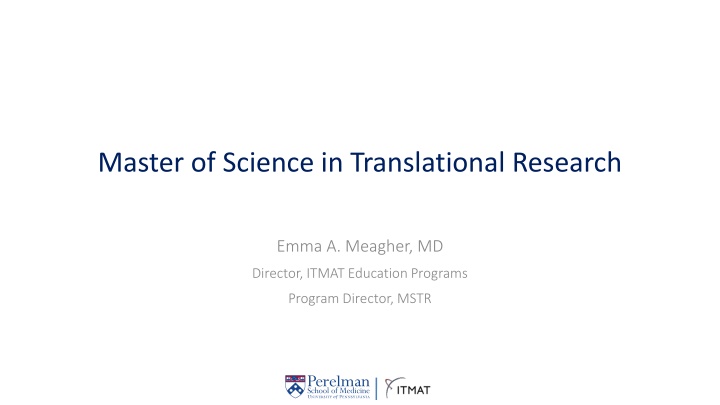
Master of Science in Translational Research Program Overview
This program, under the leadership of Dr. Emma A. Meagher, offers a comprehensive curriculum focusing on Clinical Research, Translational Research, Innovation, and Health Sciences Policy. It aims to equip trainees with critical thinking skills to address research inquiries through team mentoring, core courses, and experiential learning. With concentrations in diverse areas like Bioinformatics and Regulatory Science, the MSTR program prepares students for impactful careers in research and academia.
Download Presentation

Please find below an Image/Link to download the presentation.
The content on the website is provided AS IS for your information and personal use only. It may not be sold, licensed, or shared on other websites without obtaining consent from the author. If you encounter any issues during the download, it is possible that the publisher has removed the file from their server.
You are allowed to download the files provided on this website for personal or commercial use, subject to the condition that they are used lawfully. All files are the property of their respective owners.
The content on the website is provided AS IS for your information and personal use only. It may not be sold, licensed, or shared on other websites without obtaining consent from the author.
E N D
Presentation Transcript
Master of Science in Translational Research Emma A. Meagher, MD Director, ITMAT Education Programs Program Director, MSTR
The Research Landscape Definition of Clinical Research Clinical Research Clinical Trials Observational Studies Pragmatic trials Proof of Concept Animals Proof of Concept Humans Basic Research + Translational Research Innovation + Health Sciences Policy + Health Systems Research
Overall Goals of MSTR Program Prepare trainees to think critically to pose and answer research questions Team Mentoring Experiential Core Courses Provide a mentored training experience in translational research by combining a structured curriculum to support project execution and professional development Laboratory Rotation, Externship, and/or Clinical Internship Elective Courses Degree Components Professional Development Research Project
MSTR Concentrations Connecting the basic science of disease with human medicine Adopting informatics methodologies to develop and test hypotheses Discovery Translational Therapeutics and Regulatory Science Bioinformatics/ Biomedical Informatics Core Courses Navigating both business and academic environments during research conduct and evaluate commercialization opportunities Entrepreneurial Science Testing discoveries for clinical effect
General Information The program enrolls ~20 students per year Funded (NIH CTSA TL1) trainee slots for predoc students are available Students apply early in their 3rd year of Med School (Oct) Interviews are in Nov; Selection occurs in Dec Students start program at the end of their 3rd year (July)
Integration of Curricula Sample Study Plan YEAR FALL SPRING SUMMER Module 1 Module 2 1 Module 2 Module 4 Module 4 2 Module 4 Module 5 Step 1 USMLE Matriculate into MTR July (during Summer Session II semester) 3 Apply to program Research & course work MTR Research & course work MTR Research & course work MTR Research & course work 4 MTR Research & course work Module 5 Complete research 5
MSTR Curriculum Each student is guided by a mentoring team to develop a plan of study tailored to their research project and career interests. MSTR First Year Summer Session II Fall Spring Summer Session I MTR 6010 Review Writing MTR 6040 MTR 6000 Biostats Scientific & Ethical Conduct MTR 6050 Data Manuscript Writing MTR 6020 Proposal Development IRB Membership begins (6 months) MTR 9999Lab 1 MTR 6030 Professional Skills Development Program (Years 1 & 2) Disease Measurement MTR Elective 1 MSTR Second Year Summer Session II Fall Spring Summer Session I MTR 6070 Thesis MTR 6080 Thesis Thesis Defense IRB Membership cont. MTR Elective 2 MTR 9999 Lab 2 Courses are designed with a student-centered approach where students are engaged in group projects and presentations, peer to peer feedback, and case-based discussions.
Research Project timeline based on a July 2023 matriculation Written Thesis & Oral Defense Faculty Review & Presentation Project Execution Submit Final Proposal MTR 602 Peer Review Refine Proposal Initial Proposal Late Sept 2023 Spring 2025 April-June 2023 Early Sept 2023 July-Aug 2023 2023 to 2025
Clinical Rotations Year 1 MSTR Summer Session II Fall Spring Summer Session I MTR MTR MTR 6040 Elective 1 MTR 6050** MTR 9999 Lab 1 6010 & 602 6000 & 6030 Professional Skills Development Program Year 2 MSTR Summer Session II Fall Spring Thesis Defense (MTR 6070/6080) Jan - April Clinical Rotations Permitted July/August Clinical Rotations Permitted Elective 2 MTR 9999 Lab 2 **MTR 605 Data Manuscript Writing is a required course and is only offered in Year 1, Summer Session I
Finances YEAR 1 FALL SPRING SUMMER Module 1 MD tuition (by semester) Module 2 MD tuition (by semester) 2 Module 2 MD tuition (by semester) Module 4 MD tuition (by semester) Module 4 3 Module 4 MD tuition (by semester) Module 5 MD tuition (by semester) MTR tuition (by course) TL1 Stipend starts July 1st 4 MTR tuition (by course) TL1 Stipend MTR tuition (by course) TL1 Stipend MTR tuition (by course) TL1 Stipend ends June 30th 5 MTR tuition (by course) Module 5 + MTR MD tuition (by semester)
Grant Funding & Tuition Costs All TL1 scholars receive a cost-of-living stipend of $26,352 for one year, paid monthly Stipend level is set by the NIH each year. Tuition Costs to student $66,600 (Total MSTR degree cost in FY 23, see most current tuition rates) $20,200 in tuition costs is provided by appointment to the TL1 grant Subtract $11,100 (PSOM additional course policy for 2 courses) This leaves $35,300 estimated out of pocket costs for MSTR tuition The out-of-pocket tuition cost is roughly equivalent to the one semester of MD tuition that is not charged during Fall of year 5. If you receive a PSOM scholarship, it can not be used during the MSTR program, thus you are taking on an additional financial burden.
Current MD-MSTR Students Student Research Project Mentor Changes in the dynamical stability of brain activity during different states of consciousness Developing Imaging and Liquid Biopsy Biomarkers for Pediatric Brain Tumor Prognoses and Treatment Response. Investigating Immune Mechanisms in FLASH Radiotherapy Andrew G. Richardson, PhD Austin Borja Phillip Storm, MD Adam Resnick, PhD Debanjan Haldar Andy Minn, MD, PhD Keith Cengel, MD, PhD Tristan Lim Christina Murphy TRPA1 activation in mammalian skin regeneration Thomas Leung, MD, PhD COVID-19: Elucidating the Role of the Nasal Epithelium in SARS-CoV-2 Infection, Transmission, and Prevention Noam Cohen, MD, PhD Susan Weiss, PhD Ellie Sell
ITMAT MS1 Summer Internship Opportunity ITMAT offers a seven-week funded summer internship for Penn MS1 students engaging in translational research Applications for summer 2023 are due February 3, 2023 Student spotlights and a list of former interns and projects Questions can be directed to Megan Maxwell at mmaxwell@upenn.edu
Next Steps Contact ITMAT Ed with any questions discuss research areas of interest mentor selection, program and/or funding logistics Start to think about areas of research interest Call for applications to the program goes out in Aug/Sept of your 3rd year
MSTR Contact Information Emma A. Meagher, MD, Program Director emma@upenn.edu Megan Maxwell, MSW, Associate Director mmaxwell@upenn.edu Visit website
MSTR Graduate Outcomes 2022 MSTR Graduate Outcomes 2022 Grant Type Number Awarded K23/K08/K01 47 Other career development 19 MSTR Graduates n=174 K23/08/01 Awards 64 Applied 47 Awarded 1 Pending 75% Awarded F32 3 79% Faculty (96) 10% Clinical or Research Training (12) 7% Research in Pharma/Biotech Industry (8) 4% Clinical Roles (5) Postdoctoral Graduates 70% (n=121) R01 27 R21 10 R56 2 13% Faculty (7) 79% Clinical Training (42) 6% Clinical Roles (3) 2% Other (1) K23/08 Awards 1 Applied 1 Awarded Predoctoral Graduates 30% (n=53) U01 3 Projects in P/U, Other Federal & International 57 Foundation 125 Venture 4 Capital/Accelerators Pharma/Biotech 104

